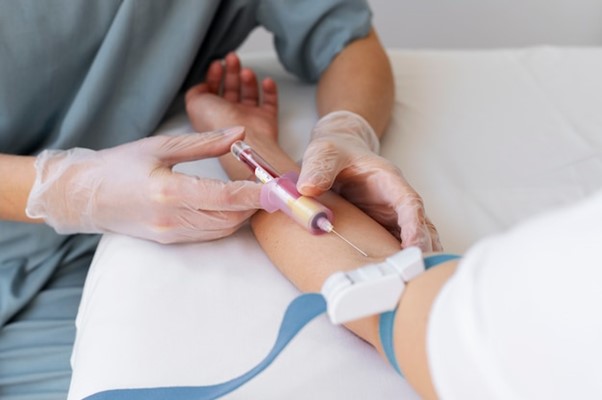Maintaining a proper balance of electrolytes is essential for overall health.
Electrolytes are minerals that support various bodily functions, from fluid balance to nerve and muscle activity.
What is an Electrolyte Panel?
An electrolyte panel is a blood test measuring seven crucial electrolyte levels:
- Sodium
- Potassium
- Calcium
- Chloride
- Magnesium
- Phosphate
- Bicarbonate
These minerals are vital for functions including:
- Fluid balance
- Muscle contractions
- Nerve signalling
- Healthy bones and teeth
When electrolyte levels become too high or too low, it can lead to an imbalance.
Conditions like
- Dehydration
- Cardiovascular
- Kidney disease
- Diabetes
can cause this.
What Do Electrolytes Do?
Electrolytes are present in blood, tissues, and body fluids, carrying an electrical charge when dissolved.
This charge is essential for critical bodily functions, including:
- Balancing the body’s water levels
- Regulating heart rate and rhythm
- Supporting muscle and nerve function
- Stabilizing blood pressure
- Promoting strong bones and teeth
An imbalance can result in serious health problems, including
- Muscle weakness
- Dehydration
- Irregular heartbeat
- Seizures.
What is the Purpose of an Electrolyte Panel?
An electrolyte panel detects imbalances due to various conditions, such as dehydration, heart or kidney disease, liver disease, and diabetes.
It also helps monitor the effects of treatment for these conditions.
For instance, if you’re on hypertensive drugs or undergoing dialysis, this test ensures your electrolytes stay in a healthy range.
This panel may be recommended if you experience fatigue, confusion, muscle cramps, nausea, or irregular heartbeat, which could indicate unbalanced electrolyte levels.
What Happens During an Electrolyte Blood Test?
The test involves a simple blood draw. A healthcare professional inserts a needle into a vein to collect a sample, which is sent to a lab for analysis.
Fasting isn’t typically required unless other tests are being done simultaneously.
Staying hydrated and avoiding smoking before the test can facilitate the process, as nicotine constricts blood vessels.
What Are the Normal Electrolyte Levels, and What If They’re Imbalanced?
Electrolyte levels are measured in various units, with standard ranges varying by age, sex, and health conditions. Generally, normal ranges are:
Sodium: 136 to 144 mmol/L
Potassium: 3.7 to 5.1 mmol/L
Calcium: 8.5 to 10.2 mg/dL
Chloride: 97 to 105 mmol/L
Magnesium: 1.7 to 2.2 mg/dL
Phosphate: 2.5 to 4.8 mg/dL
Bicarbonate: 22 to 30 mmol/L
If results show imbalances, further tests may be ordered to identify the cause.
Not all imbalances require immediate treatment, but your doctor will advise on the next steps.
Take Control of Your Health with Ruler Diagnostics!
At Ruler Diagnostics, we provide accurate and reliable electrolyte panel tests to help you manage your health effectively. Whether monitoring an ongoing condition or ensuring balance, we’ve got you covered. Schedule your test today and take the first step toward better health!




